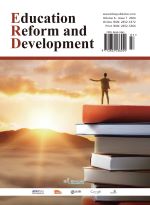Abstract
This study investigates the use of teachers’ regulative discourse in an online academic writing course from the perspective of Bernstein’s pedagogic discourse theory. By observing and analyzing the data from the “Academic English Writing” course on the China University MOOC platform, the study examines the forms, syntactic expressions, and functions of directives used by teachers in online classes and explores their impact on teaching and student learning. The findings reveal that teachers prefer to use direct regulative discourses, such as imperative sentences while utilizing indirect and more polite discourses less frequently. The findings help to provide references for MOOC teachers to optimize their use of regulative discourse.
References
Bernstein B, 1996, Pedagogy, Symbolic Control and Identity: Theory, Research, Critique. Taylor & Francis, London, 1–196.
Liu YB, Hong HQ, 2009, Regulative Discourse in Singapore Primary English Classrooms: Teachers’ Choices of Directives. Language and Education, 23(1): 1–13.
Wan B, Xiao LY, 2022, A Review of Domestic English Classroom Teacher Discourse Research in the Past Decade. Foreign Language Studies, 10(3): 48–55 + 107.
Wang TT, Zhou XP, Zheng FJ, 2016, A Study on the Paradigms and Functions of College English Teachers’ Classroom Prescriptive Discourse. Journal of Jiangxi University of Science and Technology, 37(4): 79–83.
Liu YB, Zhang HP, 2010, A Corpus-Based Study of Prescriptive Discourse in Middle School English Classrooms. Foreign Languages and Their Teaching, 2010(4): 14–18.
Christie F, 2002, Classroom Discourse Analysis: A Functional Perspective. Continuum, London, 1–208.
Bernstein B, 1990, Class, Codes and Control: The Structuring of Pedagogic Discourse. Routledge, London.
Badley GF, 2020, Why and How Academics Write. Qualitative Inquiry, 26(3–4): 247–256.
Hughes SG, 1993, A Handbook of Classroom English. Oxford University Press, Oxford, 1–113.
Searle JR, 1969, Speech Acts: An Essay in the Philosophy of Language. Cambridge University Press, Cambridge, 1–198.
Iedema R, 1996, ‘Save the Talk for After the Listening’: The Realization of Regulative Discourse in Teacher Talk. Language and Education, 10(2): 82–102.
Lin ZJ, Liu YB, Wang B, 2009, Current Situation and Prospect of Domestic English Classroom Discourse Research. Journal of Xi’an International Studies University, 17(1): 100–104.
Yan YW, Li Q, 2023, A Contrastive Study of Instruction in English and Chinese Textbooks Under Discourse Analysis Theory. Chinese Language Learning, 2023(3): 72–83.
Ma Y, Liu YB, 2013, Research on English Classroom Discourse in China: An Overview and Prospects. Foreign Language Teaching, 2013(2): 42–47.
Wang TM, Fu C, Yang C, 2022, A Comparative Study on the Types of Classroom Instruction by Novice and Proficient International Chinese Teachers. Journal of Research on Education for Ethnic Minorities, 2022(5): 169–176.
